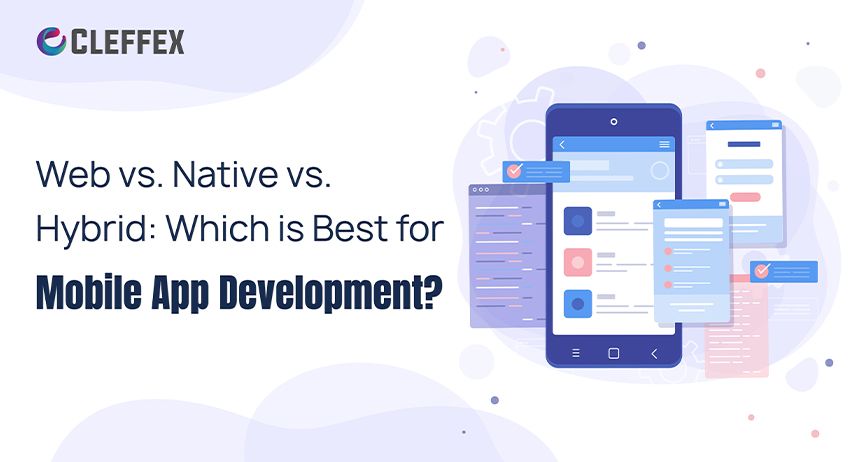The confusion regarding web vs. native vs. hybrid mobile app development is in the air due to the expanding number of smartphone users believed to be in the billions. It is clear that the mobile application market is exploding, a pretty good reason why you need app development services in Canada. Adult smartphone users access mobile internet for an average of 4 hours per day, and they majorly spend time on mobile apps rather than on a web browser. Mobile app development has shown to be a winning strategy for anyone looking to survive and expand in today’s competitive industry.
Businesses can use mobile apps to reach a larger, mobile-first audience that is increasingly adopting apps to get things done such as social media, entertainment, productivity, dining/takeout, communication, travel, etc. So, partnering with a reputed mobile app development company can help you reach out to these mobile users with the appropriate solution or app. This when done at the right time is a terrific way to stand out and increase your business sales.
And developing a useful, engaging, and high-performing mobile app is no easy walk in the park. One of the most major roadblocks lies in deciding whether you need a web, native, or hybrid app. If you’re having trouble deciding which type of mobile app is best for your company, we’ll help you out with this web vs. native vs. hybrid mobile app development article to make an informed decision.
Why Do Businesses Need Mobile App Development Services?
When it comes to mobile app development services, there is no one-size-fits-all solution for any organization. Each of these app types has both advantages and disadvantages, and the choice should be made based on your company objectives. Before you make a hasty decision, it is critical to examine the following reasons.:
- How big is your target audience?
- The level of user experience you wish to provide via the app
- How fast do you want your app to perform?
- The app’s complexity and the features you want to incorporate
- Mobile app development budget
So, let’s understand these app types and which technologies you should consider when choosing the right app development services in Canada.
Comparison: Web vs. Native vs. Hybrid Apps
1. Web Apps
The basic confusion here will be between a website and a web app. So, let’s clear that right away – a website is primarily intended to provide information, but a web application provides greater interactivity and functionality. It is compatible across any browser or smart device. The app development services in Canada develop and program them specifically to the chosen operating system, such as iOS or Android.
Every mobile app development company uses programming languages such as CSS and HTML to develop web apps. Users don’t have to download and install them on their device, and it takes up zero device space. They are accessible and compatible across all browsers (Chrome, Safari, Firefox, Edge, etc.) in a device. Organizations are increasingly partnering with a mobile app development company to invest in web app strategies for better market edges.
Web apps will help you push mobile-friendly irrespective of device/browser types and are cost-effective to develop. Developing one with the best assistance from leading app development services in Canada will help you flaunt your products and services to a broad range of target audiences.
Pros:
- Considering the web vs. native vs. hybrid app scenario, web apps are packed with a simple codebase. This makes them easy to maintain and in fixing glitches.
- Web apps are cross-browser and cross-device compatible that enables them to share their codebase across different platforms. This characteristic of web apps ensures you a cost-effective way to reach a broader audience base.
- Since web apps can be run from any device browser using URLs, you don’t have to upload them in any platform-specific app store. It doesn’t need any download and installation on any user device and provides better accessibility. Also, developers or a mobile app development company doesn’t have to bother about the hassles of distribution, deployment, or building new features.
- The single codebase attribute of web apps can save a lot of development time and costs.
Cons:
- Web apps lack critical UI design elements seen in native apps. It puts more load on the home screen, cannot work offline, or send out push notifications, to users.
- It doesn’t offer smooth or seamless user interactions thereby hampering the user experience
- Web apps perform poorly with unstable networks.
- User reach may get affected since web apps are not available on any app store.
2. Native Apps
App development services in Canada develop native apps using platform-specific programming languages and to run on a specific device. To make it more clear, native apps on an iOS platform can only be developed with the Objective-C and Swift languages. For Android-based native apps, programming languages such as Kotlin and Java are used. You will have specific development tools, SDK, and interface components for each platform you pick for native mobile app development.
Unlike web apps that are cross-platform compatible, the platform-specific nature of native apps makes it impossible to run on both iOS and Android at the same time. If it’s built for iOS, it will only work for iOS and will only be available in the Apple App Store. This is the same with Android, as it will only work on Android, and you will only find such native apps in the Google Play Store.
Pros:
- A mobile app development company builds customized, and platform-specific native apps to make them highly responsive
- The high performance and speed helps in enhancing the user experience
- Availability in platform-specific app stores helps you to reach a broader audience base with more user downloads
- Native apps are intuitive, interactive, and run more efficiently. It can offer unique user experiences by taking advantage of the device’s key features
- Every mobile app development company or developer follows platform-specific, standard UI practices to develop native apps. This helps them deliver an enhanced experience to users
- Most of the time, native app development coding is efficient, clean, and error-free. Native apps are also less reliant on hardware.
Cons:
- The complexity of the programming languages used to develop native apps is a challenge and can only be accomplished by proficient developers.
- Considering web vs. native vs. hybrid app development costs, native apps are way costlier than web or hybrid apps. This is because of its platform-specific nature
- Native apps are not the best choice to build simple business apps
- Again, the platform-specific nature make it lacks cross-platform compatibility
- Complex updating and maintenance procedures
3. Hybrid Apps
Hybrid apps are the best of both worlds – web and native apps. Their outlook and feel are similar to web apps but users can download and install them like a native app. Simply put, hybrid apps perform like native apps but with the added advantage of working across different platforms similar to web pages. Programming languages such as CSS, JavaScript, or HTML are used to develop hybrid apps and they always run in a web view.
Hybrid apps are platform-specific and cross-platform compatible at the same time meaning you can distribute the same codebase across diverse platforms.
Businesses betting on maximum audience reach can go with the best hybrid app development solutions. This helps them make their app available on any leading platforms such as iOS, Android, etc. Furthermore, developers have access to specific development tools, SDK, and UI components, much like it is with native apps.
Pros:
- Hybrid app development is faster as it utilizes a significant range of standard web technologies
- Developers can significantly save their time as hybrid app development only requires a single codebase to be deployed across multiple platforms
- Hybrid apps have access to a device’s hardware as well as its internal API to deliver better performance
- Hybrid app development, deployment, updating, and maintenance are effortless as the apps have minimal glitches
- Cost-effective approach in boosting your audience base by making the app available on both Apple App Store and Google Play Store
Cons:
- Hybrid app performance gets affected since it relies on a web view to power the JavaScript code and to display the UI
- Slower performance, and unable to provide some native-like experiences due to the app being simultaneously built for two platforms.
- Development costs are higher due to a third-party system dependence and wrapper requirement
- Less intuitive, and interactive than native apps, making it less suitable to offer enhanced user experience
- With hybrid apps, users may frequently have a negative user experience
- Customizations are prone to comprise the hybrid app’s core advantage
Web vs. Native vs. Hybrid: Which Suits Your Business?
By considering the detailed web vs. native vs. hybrid app comparison explained above you can make the right decision that aligns with your business vision. All you have to do is choose a top-notch mobile app development company proficient enough to cater to your requirements. They will ensure to build you high-performing, intuitive, and interactive mobile apps. They will also incorporate the best of technology developments to help you edge out your competition. In the end, their capabilities will make your business app secure and robust for delivering enhanced user experiences










2 Responses
This was a very informative blog and I really enjoyed reading it. But I also have a few points regarding it to discuss with you.
Native IOS App Development is the best way to develop an IOS app that will provide the best performance for your users. Native iOS apps are incredibly user-friendly and efficient and they are also more likely to be popular with customers
Here are the advantages of developing native iOS apps:-
1. More Secure
2. More Interactive And Intuitive
3. Better Scalability
I really happy found this website eventually. Really informative and inoperative, Thanks for the post and effort! Please keep sharing more such blog.